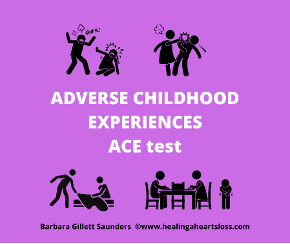I want to share this with counsellors, since I recently realized there are some who have never heard of this. So interesting; how trauma affects how we turn out as adults…who would have thought this?
Ya, right!!!!
How could traumas or “bad’ experiences in childhood, not affect us? I am not going to go into a lot of scientific explanation here. I will let you do more research on your own. Suffice to say, there was research done several decades ago that brought to light the need and creation of the ACE Test…Adverse Childhood Experience Test.
I will give an ACE chart that I came across, but know, there are different versions of this and with the ever-changing dynamics of our world, you will find new questions added to this test.
The ACE test questions reflect on lived experiences from age 0 to 18 years of age. They are on a basic test questionnaire, 10 YES or NO questions.
For every “YES” answered to a question with a final score above “4” there is research that correlates with a child’s performance in grade school, high school and into adult hood with ability to thrive with employment and relationships. The potential for increased health problems increase with higher scores also.
When you look at the ACE test you will be able to see for yourself, how many people you know or know of who potentially have high ACE scores. One course I took about the “Brain Story” stated many people have higher ACE scores than we may realize, but no one is identifying this.
When individuals see what experiences have shaped their life, they can better understand why they are the way they are; and take away the negative self talk or shame with not being the way other people seem to be.
Adverse Childhood Experiences can cause a child to misbehave, not sit still, seem overly active and anxious, unable to focus for long periods of time, have trouble with learning in school, have trouble holding onto a job when they enter the work force, may have trouble setting boundaries and be explosive. All of these are indicators as potential outcomes for individuals with high ACE scores.
The flip side is positive reinforcements that counteract the adversity and potentially balance out some of the negative outcomes. The positive supports can come from family, friends, teachers, counsellors, mentors or anyone who cares for that person.
ACE Questions
The most important thing to remember is that the ACE score is meant as a guideline: If you experienced other types of toxic stress over months or years, then those would likely increase your risk of health consequences. Prior to your 18th birthday:
- Did a parent or other adult in the household often or very often… Swear at you, insult you, put you down, or humiliate you? Act in a way that made you afraid that you might be physically hurt?
No___ If Yes, enter 1 __ - Did a parent or other adult in the household often or very often… Push, grab, slap, or throw something at you? Ever hit you so hard that you had marks or were injured?
No___ If Yes, enter 1 __ - Did an adult or person at least 5 years older than you ever… Touch or fondle you or have you touch their body in a sexual way? Attempt or actually have oral, anal, or vaginal intercourse with you?
No___ If Yes, enter 1 __ - Did you often or very often feel that … No one in your family loved you or thought you were important or special? Your family didn’t look out for each other, feel close to each other, or support each other?
No___ If Yes, enter 1 __ - Did you often or very often feel that … You didn’t have enough to eat, had to wear dirty clothes, and had no one to protect you? Your parents were too drunk or high to take care of you or take you to the doctor if you needed it?
No___ If Yes, enter 1 __ - Were your parents ever separated or divorced?
No___ If Yes, enter 1 __ - Was your mother or stepmother:
Often or very often pushed, grabbed, slapped, or had something thrown at her? or Sometimes, often, or very often kicked, bitten, hit with a fist, or hit with something hard? Ever repeatedly hit over at least a few minutes or threatened with a gun or knife?
No___ If Yes, enter 1 __ - Did you live with anyone who was a problem drinker or alcoholic, or who used street drugs?
No___ If Yes, enter 1 __ - Was a household member depressed or mentally ill, or did a household member attempt suicide? No___ If Yes, enter 1 __
- Did a household member go to prison?
No___ If Yes, enter 1 __
Now add up your “Yes” answers: _______ This is your ACE Score
All my best,
Barbara Gillett Saunders
Grief Counsellor/Thanatologist

